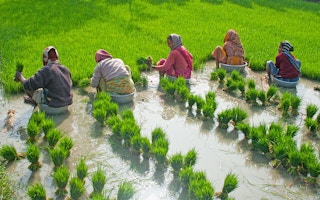The COVID-19 pandemic, rising rates of global poverty and inequality, persistent conflict, and the escalating climate and biodiversity crises are shocks and stresses that together contribute to increasing hunger, as well as growing food and nutrition insecurity.
To help tackle this urgent problem more effectively, and make the global food system more stable and resilient, governments should consider establishing a new, multilateral, United Nations-led Food Systems Stability Board (FSSB).
Today, between 720 million and 811 million people – about 10 per cent of the world’s population – go to bed hungry every night, and at least 2.4 billion lack access to a healthy and nutritious diet. Absent major international action, these trends are likely to persist.
The latest report by the Intergovernmental Panel on Climate Change demonstrates that global warming’s effects have left no region untouched, with significant implications for the food system over the coming decades.
Food systems underpin the security of the global economy, as well as national security in many countries: hunger and lack of access to food have historically driven civil unrest. These systems are also among the principal drivers of ecosystem loss and climate change, with agriculture and land-use change responsible for a quarter of global greenhouse-gas emissions.
At the same time, ecosystems such as forests, mangroves, and the ocean are central to humanity’s efforts to adapt to the climatic changes already underway.
Ensuring the long-term resilience of the global food system will require a significant multilateral collaborative effort. This should build on existing structures and institutions such as the Committee on World Food Security, the Food and Agriculture Organisation, the World Food Programme, and the World Bank.
It will also demand concerted attention from heads of state and government, ministers of finance, and the leaders of multilateral financial institutions.
A quartet of international meetings – the UN Food Systems Summit in September 2021, the G20 summit in October, the UN climate conference (COP26) in November, and the Nutrition for Growth Summit hosted by the Japanese government in December – offer a rare opportunity to focus international attention on the hunger and food-security crisis, and its links to the changing climate.
“
The FSSB could support contingency planning for cross-border crisis management, especially with regard to systemically important food crops or areas particularly affected by climate vulnerability, biodiversity loss, and/or future pandemics.
Each of these gatherings could pave the way for the creation of an FSSB of national governments and international organisations working to address this issue.
This could be part of a broader global effort to enhance food governance and achieve – in the words of the government of Indonesia, which will hold the G20 presidency in 2022 – a “just and affordable transition toward net zero.”
Moreover, there is an encouraging precedent for such a body. The Financial Stability Board (FSB), established by G20 finance ministers in April 2009 with the aim of preventing a repeat of the 2008 global financial crisis, has positively contributed to global macroeconomic stability and is now an authoritative, independent, and well-respected body.
Its findings directly influence the decision-making of G20 finance ministers, as well as that of the heads of the International Monetary Fund, the World Bank, and the regional development banks.
In a similar fashion, an FSSB, if established, would be charged with promoting the health and resilience of the global food system, including by addressing issues such as price stability, trade, strategic reserves, and the effects of climate change on production.
The board would fully respect national sovereignty, and not issue legally binding recommendations. Rather, it would give credible advice to governments on how to build a food system that is better prepared to withstand future shocks and ensure greater global access to nutritious food.
While governments would decide the precise scope, structure, and composition of an FSSB, we believe the body could play a helpful role in several ways.
For example, it could analyse early-warning systems and risk-modelling data on hunger, agriculture, and climate, including from the existing Agricultural Market Information System database. It could also advise the World Trade Organisation and national governments on food-related trade policies, while helping countries respond to changing market dynamics and a volatile climate.
Additionally, the FSSB could support and enable countries to submit voluntary five-year food system risk assessments and resilience plans.
It could also gather and share knowledge about global food-trade vulnerabilities, such as those relating to climate change, conflict, lack of crop diversity, pollinator loss, and other threats, and identify and review the regulatory, supervisory, and voluntary measures needed to address them.
The FSSB could support contingency planning for cross-border crisis management, especially with regard to systemically important food crops or areas particularly affected by climate vulnerability, biodiversity loss, and/or future pandemics.
Lastly, the board could collaborate with the IMF to include more consideration of risks related to climate, biodiversity, and food and land-use systems in the Fund’s regular Article IV consultations with member countries.
The FSSB could comprise relevant national representatives from ministries of agriculture and rural affairs, trade and commerce, health, environment, and finance, as well as international standard-setters and leading scientists in the field of global food-system risks.
As with the FSB, the institution’s audience would be member states, including heads of government, finance ministers, and other portfolios.
The current absence of an FSSB is a notable gap in the international governance architecture required to bolster the sustainability, equity, and resilience of the global food system in the twenty-first century and beyond.
At the UN General Assembly and UN Food Systems Summit – both taking place in September – governments could agree to initiate a one-year consultation process to explore the creation of such a body. By doing so, they could contribute to a better future for hundreds of millions of vulnerable people – and ensure access to food and security for all.
Sandrine Dixson-Declève is Co-President of the Club of Rome. José Antonio Ocampo, a former finance minister of Colombia and United Nations under-secretary general, is a professor at Columbia University and an ambassador of the Food and Land Use Coalition. Felia Salim, Chair of the Board of Directors of the Partnership for Governance Reform, is an ambassador of the Food and Land Use Coalition.
Copyright: Project Syndicate, 2021.
www.project-syndicate.org









